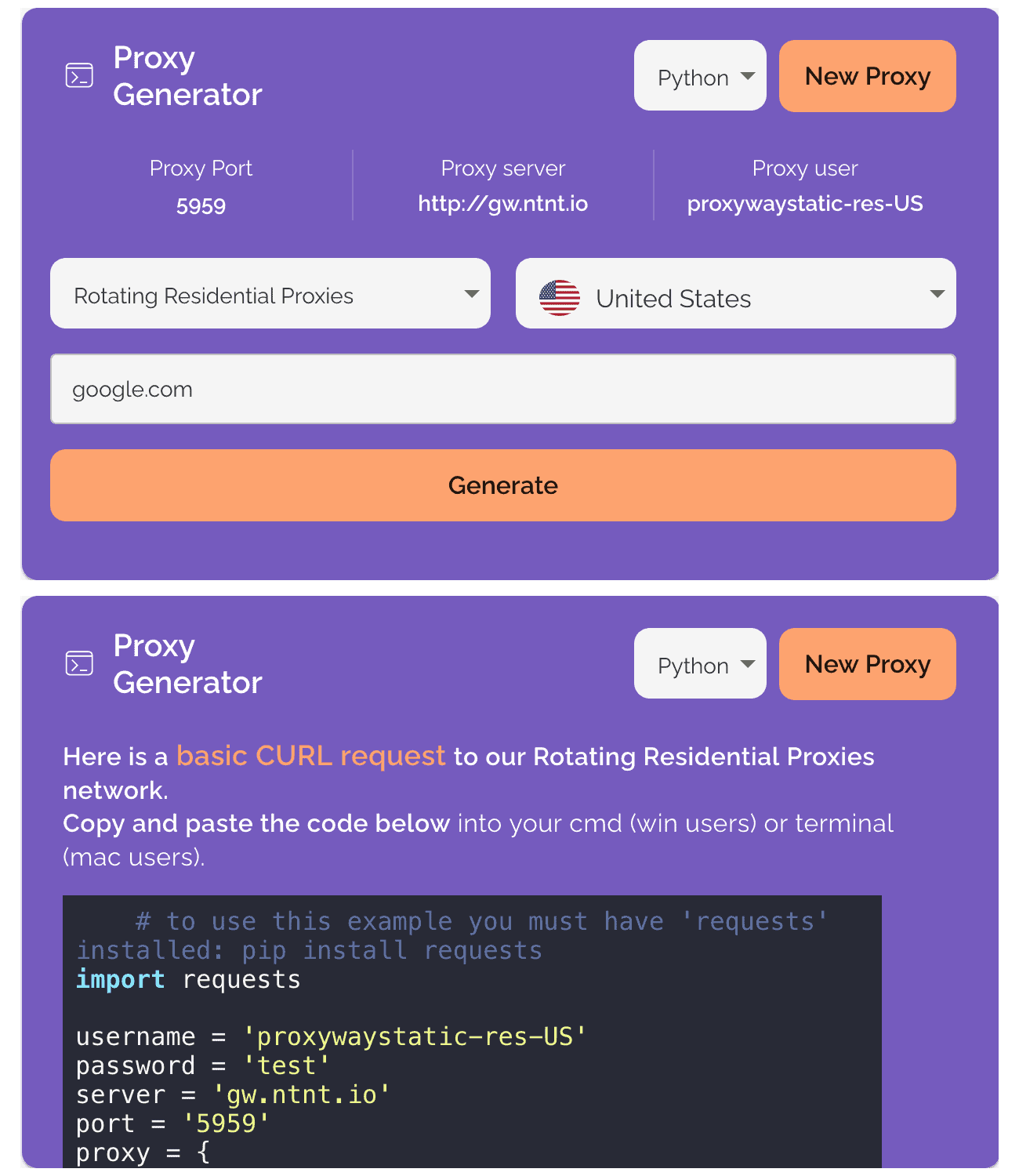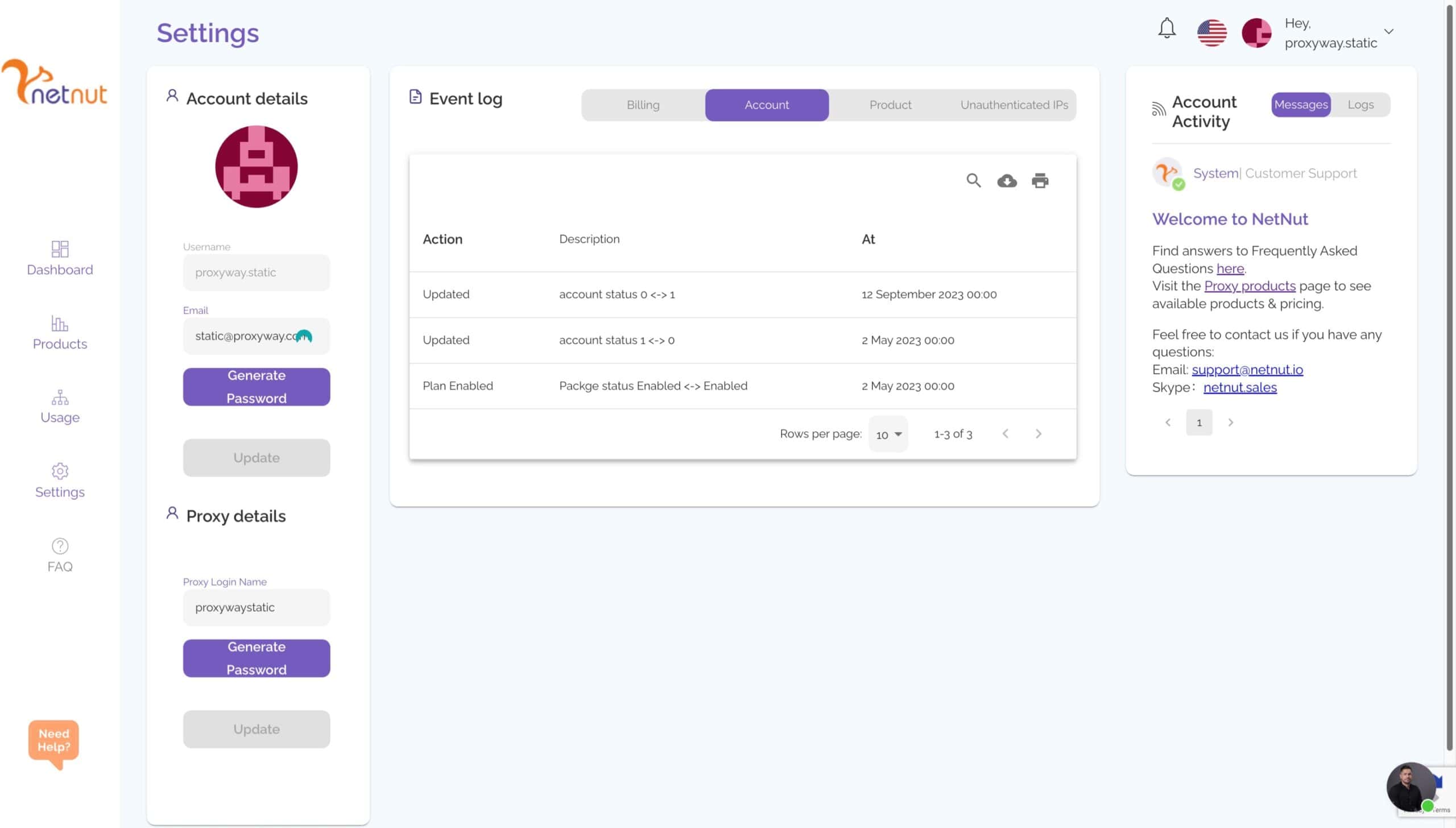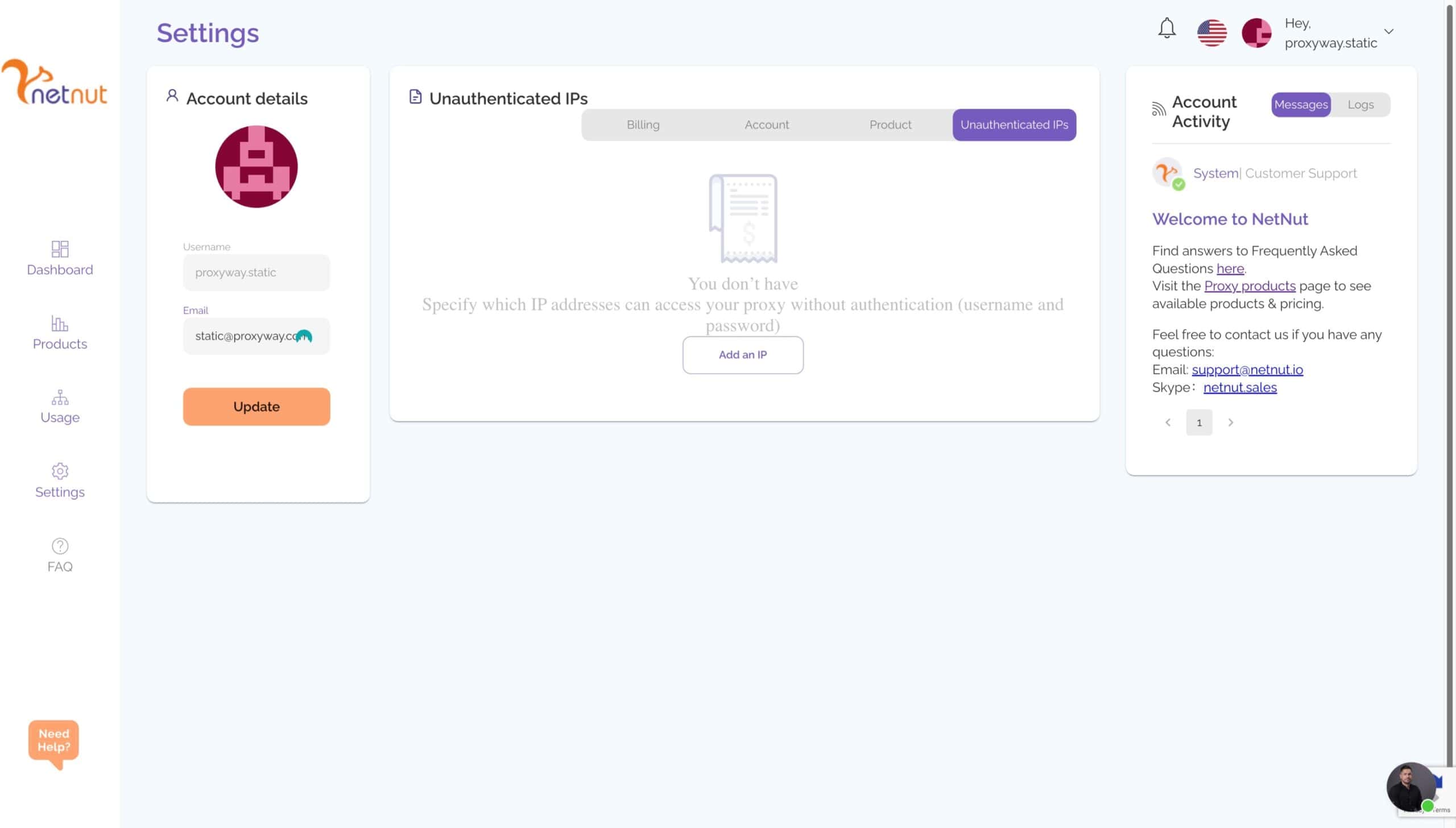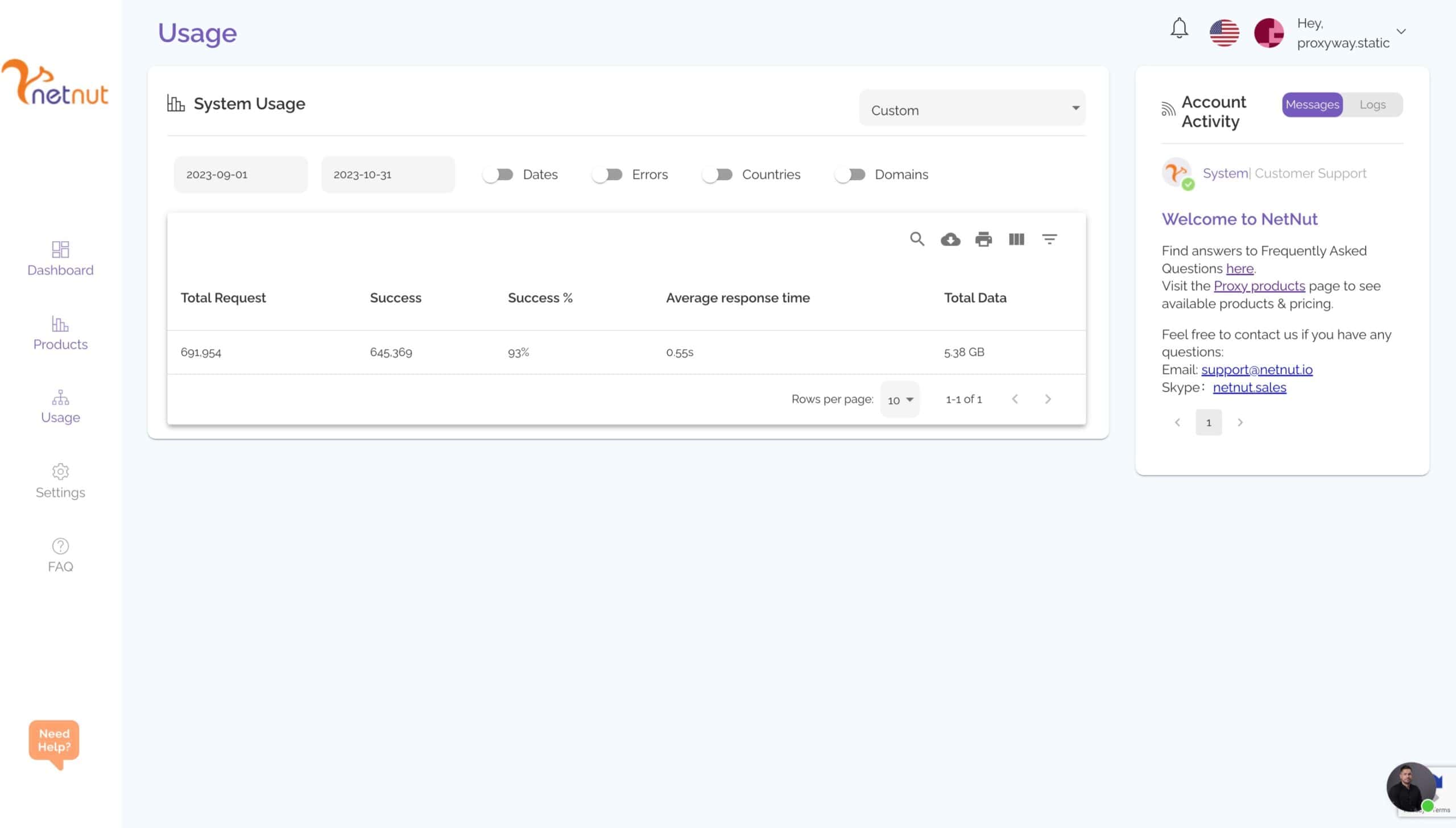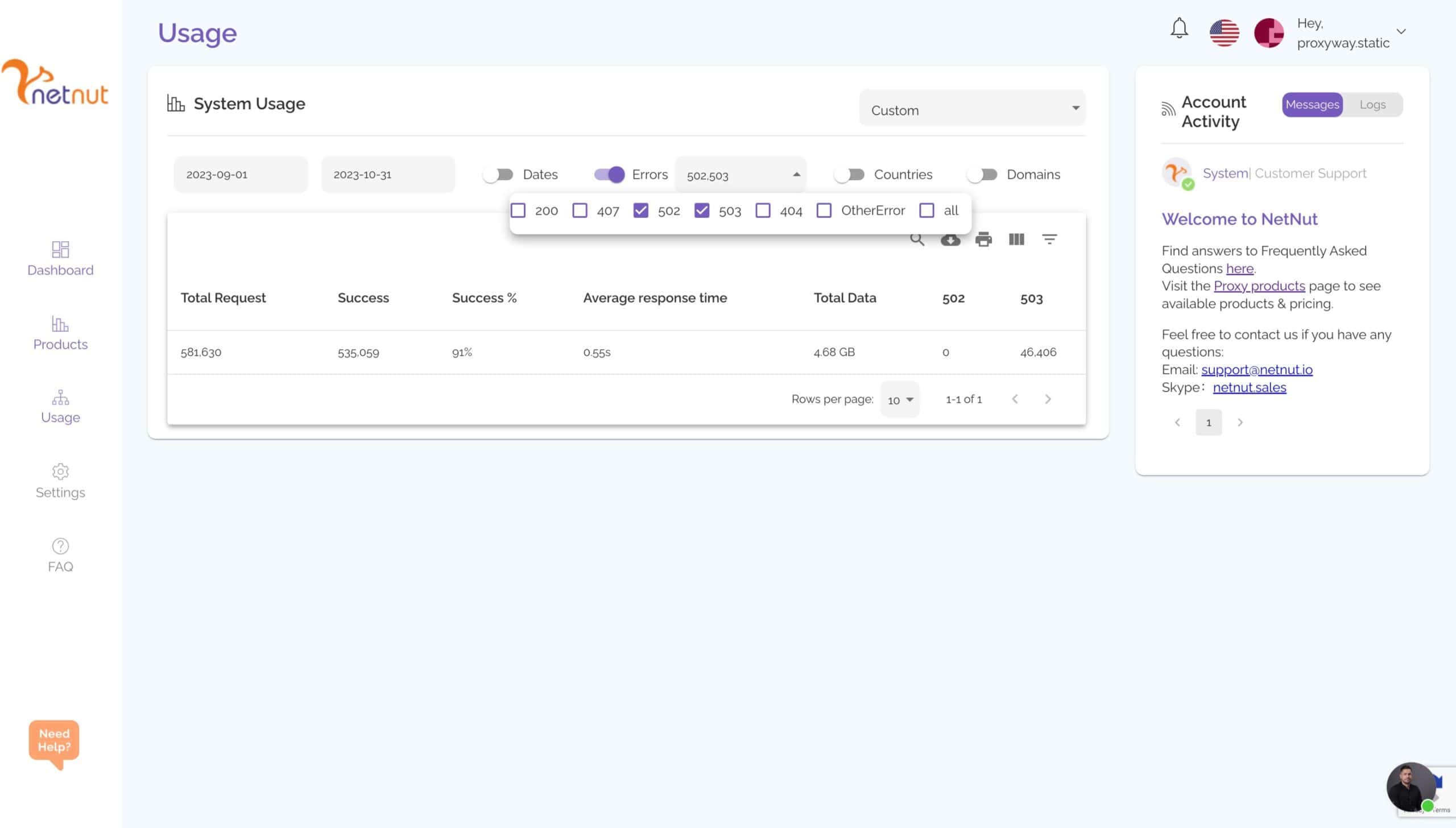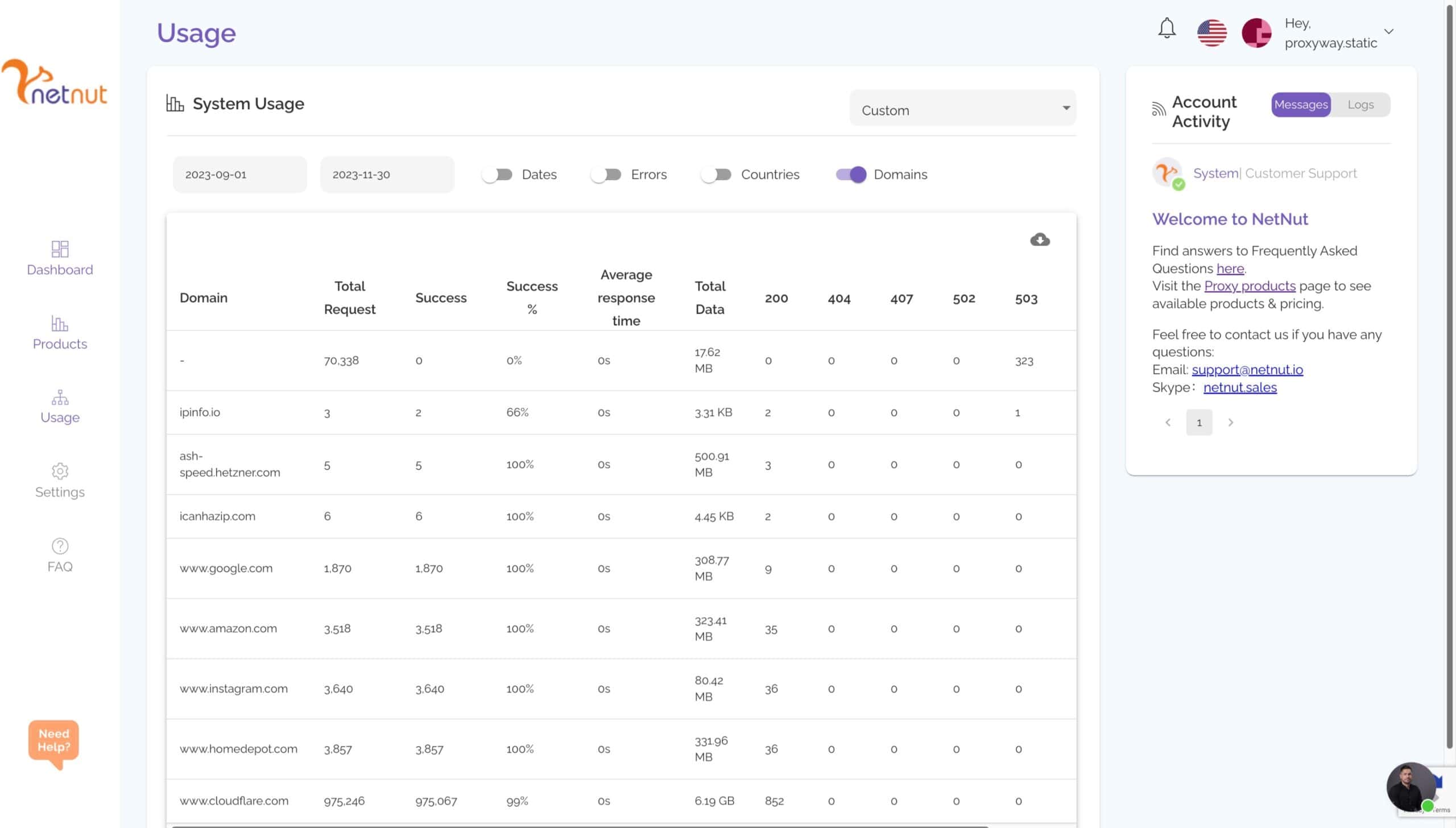
NetNut Review
NetNut controls large proxy networks that can be very fast and perform decently. But they work best for experienced users or those who want proxies at scale.
Use the code Proxyway to get a 30% discount.
NetNut is a premium provider of rotating proxy servers. It’s less popular than something like Smartproxy or Bright Data but still a well-known option among businesses. NetNut’s forte used to be ISP proxies, though nowadays it offers all major IP types.
In this review, I’ll take a close look at NetNut’s proxy services. We’ll see how it compares with other premium providers and whether NetNut really controls the fastest residential proxy network, as it likes to claim.
Here we go.
News about NetNut
-
By Adam Dubois
- Provider News
-
By Adam Dubois
- Provider News
-
By Adam Dubois
- Provider News
General Information
- Country: Israel
- Founded: 2017
- Employees (LinkedIn): 100-150
- Proxy networks: Datacenter, ISP, residential, mobile
- Other services: scraper APIs (general unblocking, SERP, B2B), professional datasets
- Supporting tools: –
- Price segment: Premium
- Payment methods: PayPal, credit card
- Trial: Available for companies
NetNut is an Israeli proxy provider established in 2017. It’s one of the larger proxy vendors, probably making it into top five by size. It’s also one of the few public companies in this market, so much information about it is public.
NetNut belongs to Alarum, which used to provide cybersec and privacy services but now focuses exclusively on web data. The main products are its rotating proxy networks. There are also several web scraping APIs and professional datasets you can try.
NetNut can safely be considered a premium provider with an eye to businesses with big needs. This reflects throughout the whole service: from customer support to pricing. The entry plans start high and you’ll get better experience – together with much better rates – paying $500 and up.
Aside from businesses, resellers are another focus. NetNut tries to lure them in with dedicated pools, elaborate usage statistics, and functionality like a proxy management API and sub-users.
Historically, ISP proxies have been NetNut’s highlight. The provider sources them via DiviNetworks, where the company pays internet service providers for sharing their unused bandwidth. This carries extra benefits compared to other ISP proxy services, namely that the IPs have real browsing history, and you might even use them in parallel with residential users.
The other networks came later, though residential proxies can be considered NetNut’s main product by now. The company isn’t open about how it sources end-user based addresses. In any case, they balance out the service and make NetNut a viable choice for most web scraping professionals.
NetNut Proxy Networks
NetNut offers access to all major types of proxy servers:
- Residential proxies from various countries around the world.
- Mobile proxies borrowing the resources of mobile phones and other devices on carrier networks.
- Datacenter proxies in a rotating pool format.
- ISP (static residential) proxies that also connect you to a large pool of IPs.
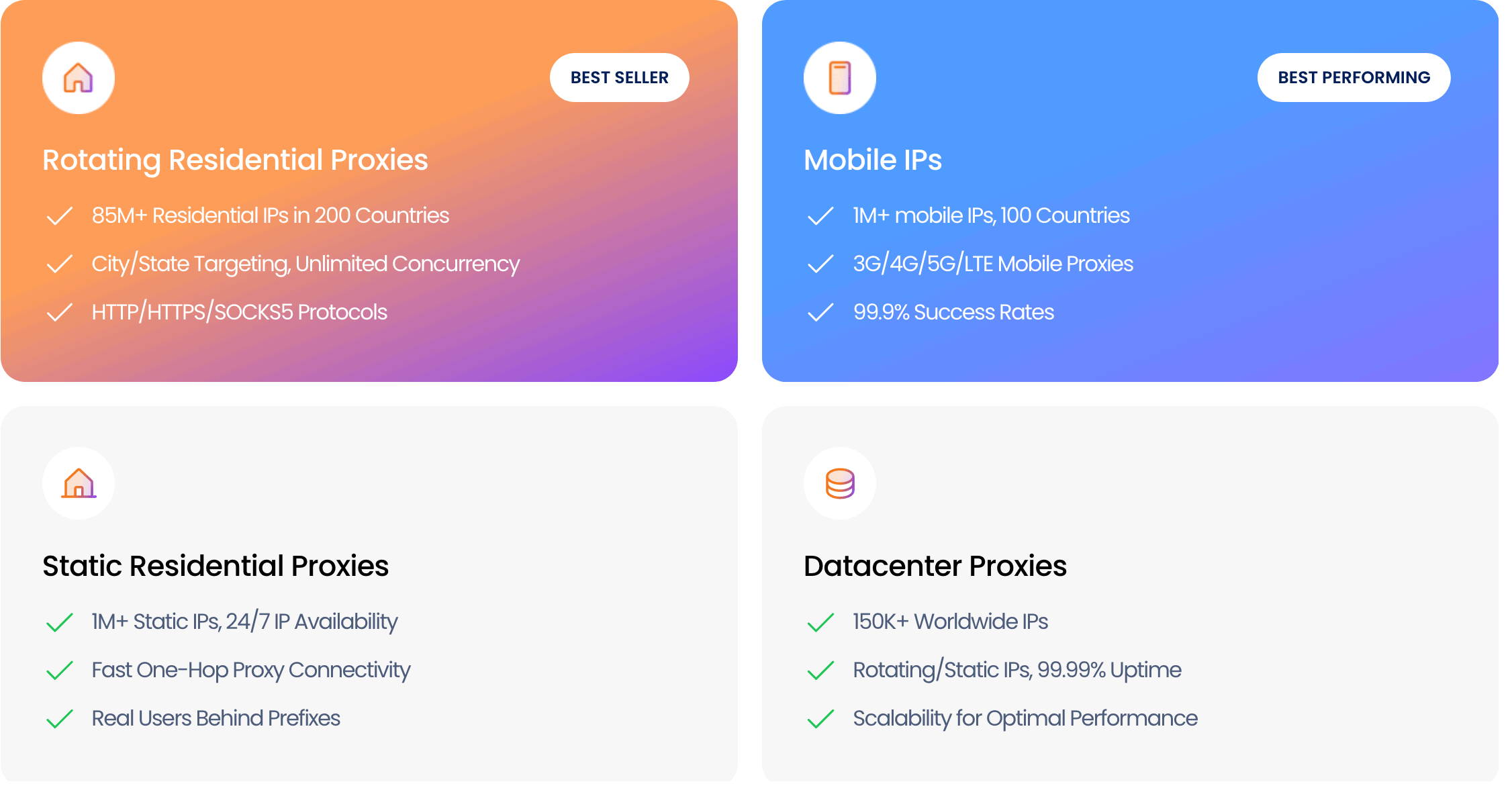
We cover individual proxy types in the expandable drop-downs below:
Residential
Residential proxies NetNut’s main product. They’re sourced using something the provider calls a proprietary reflection technology. But to make it simple, let’s just say these IPs come from laptops, phones, and IoT devices, just like most residential proxies.
Pool Size & Coverage
- Advertised pool size: 85 million
- Locations: Global
- Filtering: Global, country, state, city, ASN
NetNut advertises 85 million IPs. The number is tricky: these aren’t monthly or quarterly but rather total nodes seen since 2017. In other words, it tells us basically nothing about the current state of the proxy pool.
In any case, you can target any country in the world. If need be, NetNut offers even more granular filtering options, including city and ASN. Unfortunately, it’s not possible to select a country and ASN at the same time, which limits the usefulness of this feature.
Our benchmark (April 2025)
| Gateway | Requests | Unique IPs | Residential %* |
| Global | 1.2M over 21 days | 1,011,844 | 95.04% |
| US | 560k over 14 days | 470,287 | 95.71% |
| UK | 560k over 14 days | 351,592 | 95.79% |
| EU | 1.2M over 14 days | 560,318 | 94.89% |
| Brazil | 560k over 14 days | 457,419 | 96.10% |
| India | 560k over 14 days | 416,653 | 97.22% |
| Australia | 140k over 7 days | 44,046 | 93.89% |
* IP2Location database, Usage type data point (ISP, ISP/MOB, MOB IPs)
Comparison with other providers
Our test revealed NetNut’s proxy pool to be among the largest in the market. The provider had particularly many IPs in premium locales like the US and UK. Furthermore, most of the proxies were identified as residential.
Features
- Connection method: Gateway address
- Rotation: Every request, as long as available, long sessions (up to 1 hr)
- Protocols: HTTP, HTTPS, SOCKS5
- Concurrency: Unlimited
- Traffic: Plan based
- Authentication: Credentials, IP whitelist
NetNut’s residential proxies use gateway servers. They route your requests through the nearest load balancer and then the end user’s device.
NetNut’s residential proxies can rotate with every connection request or establish sticky sessions. They keep the same IP address until it goes offline. There’s no possibility to specify a custom rotation duration for now.
You can reach the proxy network using all three connection protocols. SOCKS5 is implemented via SOCKS5h and doesn’t transmit UDP traffic.
As is often the case with residential proxy networks, the only limitation is the money you’re willing to spend on traffic.
Integration Examples
- Basic request: USERNAME-res:[email protected]:5959
- Using location filters: USERNAME-res-sc-us_alabama_birmingham:[email protected]:5959
- Establishing sessions
- Regular: USERNAME-res-sid-ID:[email protected]:5959
- Long: USERNAME-resfix-nnid-ID:[email protected]:5959
NetNut gives you one gateway address, and you add filters or create sessions by modifying the username. This can be problematic for scenarios where credentials can’t be used; in such cases, NetNut lets you whitelist an IP and generates a list of ports upon request.
NetNut also offers a long session feature. Its implementation is tricky: you send a parameter called nnid to the proxy server, it returns a unique token, and then you use that token for subsequent requests.
Pricing Plans
- Model: Subscription
- Format: Traffic
- Modifiers: –
- Starting price: $99 for 28 GB ($3.53/GB)
- Trial: For business customers
NetNut is an unapologetically premium provider. There is no pay as you go, and the pricing plans start from $100, which is pretty expensive these days.
NetNut’s direct premium competitors all slashed their rates in 2023 and again in early 2024. NetNut finally followed suit in June 2024, then in March 2025, effectively equalizing its public prices with Oxylabs and Bright Data. In addition, NetNut tends to scale very well when buying in bulk.
Standardized pricing comparison
Performance Benchmarks
We last tested NetNut’s residential proxies in April 2025.
Infrastructure performance
Requests: Same as the pool test (140k to 1.2M per gateway)
Target: Nearest server of a global CDN (~6 KB response size)
| Gateway | Our server location | Avg. success rate | Avg. response time |
| Global | DE | 98.40% | 1.22 s |
| US | US | 98.44% | 0.84 s |
| UK | DE | 98.27% | 0.69 s |
| EU | DE | 98.93% | 0.68 s |
| Brazil | US | 96.28% | 1.17 s |
| India | SG | 97.06% | 1.49 s |
| Australia | SG | 98.56% | 1.00 s |
Yearly change (Global gateway)
| vs 2024 | vs 2023 | vs 2022 | |
| Success rate | +0.25% | +4.88% | +5.58% |
| Response time | 0.01 s | -0.92 s | -0.15 s |
Comparison with other providers
Response time with a 2 MB page
Requests: 15,000 with the Global gateway, 5,000 with the US gateway
Target: Nearest server of a global CDN
| Gateway | Our server location | Avg. response time |
| Global | DE | 6.21 s |
| US | US | 4.15 s |
Comparison with other providers
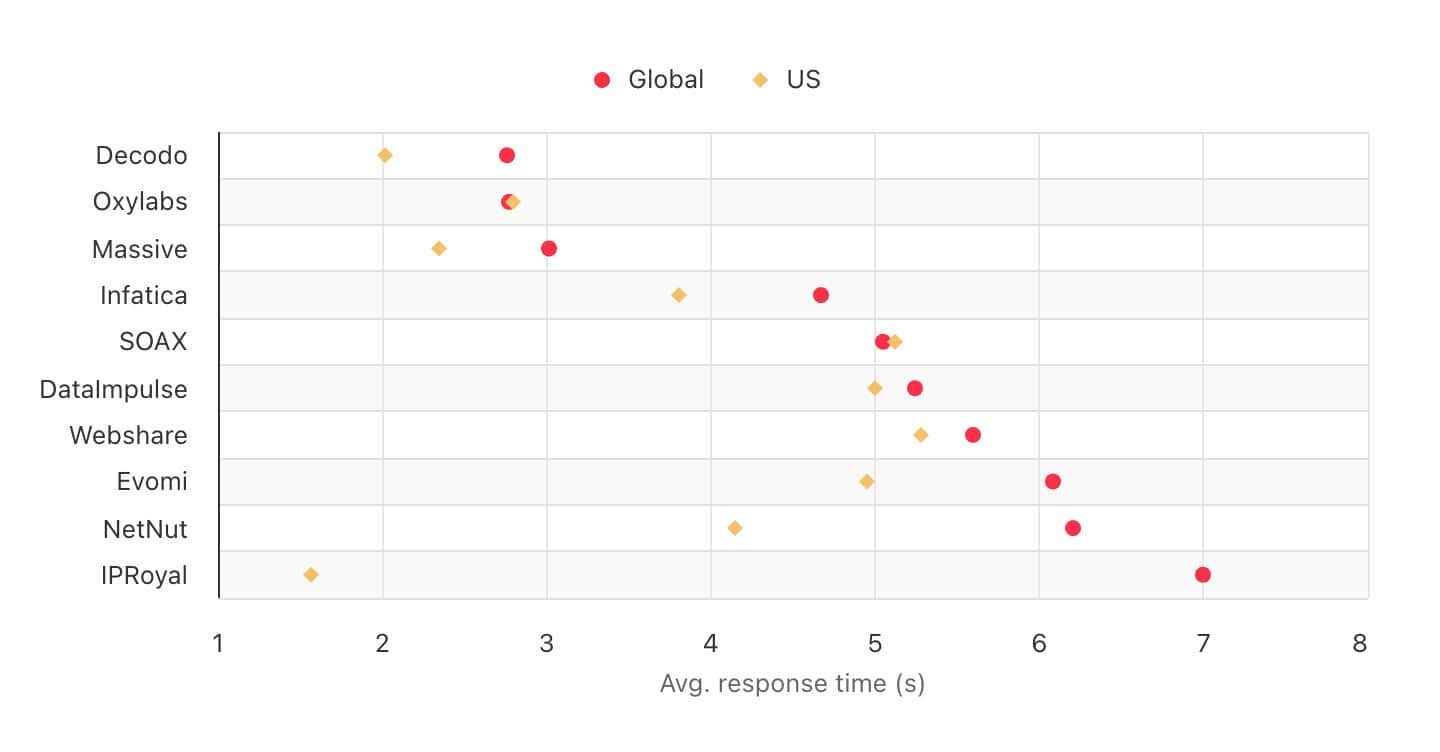
With a 2 megabyte page, NetNut was relatively slow – it took around two times longer to complete requests than Decodo or Massive. Maybe its proxy network had less throughput or experienced more load when we ran the test.
Performance with popular targets
Requests: ~2,600 per target
Location: US (both the gateway and our server)
| Avg. success rate | Avg. response time | |
| Amazon | 94.30% | 4.02 s |
| 90.96% | 5.01 s | |
| 88.76% | 4.05 s | |
| Total | 91.34% | 4.36 s |
Comparison with other providers
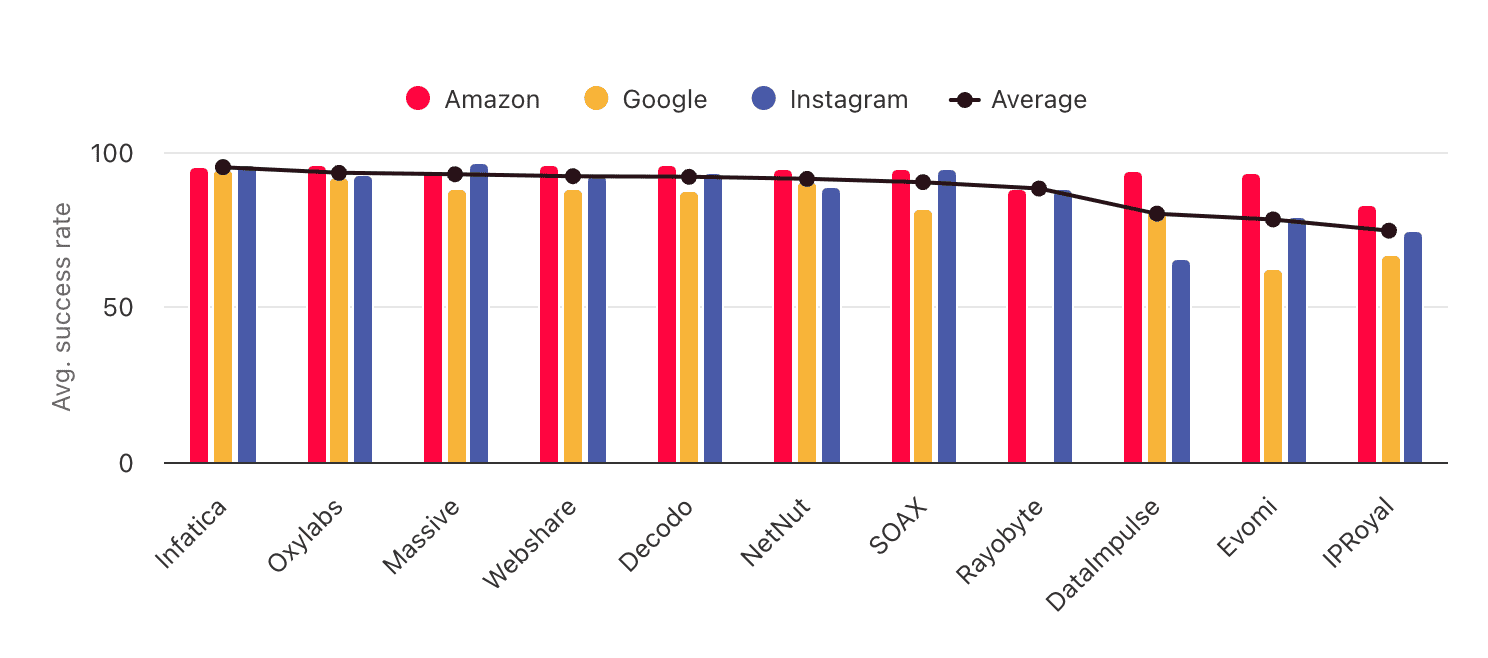
Mobile
Mobile addresses are the newest addition to NetNut’s proxy line-up launched in late 2022. This is a network of peer-to-peer devices from around the world.
Pool Size & Coverage
- Advertised pool size: 5 million
- Locations: 100+
- Targeting options: Global, country, ASN
Compared to the residential network, NetNut is modest about its mobile pool claims. The provider advertises 5 million IPs, and the number used to be just 250,000 until May 2024.
The range of supported locations is also more limited, and so are the targeting options. City-level filtering is likely unavailable due to the relatively small size of the pool. In addition, you can’t select both a country and ASN.
Our benchmark (April 2025)
| Gateway | Requests | Unique IPs | Mobile %* |
| Global | 280k over 14 days | 226,813 | 83.24% |
| US | 280k over 14 days | 143,333 | 89.78% |
| UK | 280k over 14 days | 37,705 | 77.99% |
| EU | 280k over 14 days | 65,308 | 96.35% |
| Brazil | 280k over 14 days | 124,369 | 40.87% |
| India | 280k over 14 days | 215,953 | 98.96% |
| Australia | 140k over 7 days | 5,800 | 83.84% |
* Mobile percentage: IP2Location database, Usage type data point ( ISP/MOB, MOB IPs)
In our tests, NetNut’s mobile proxy pool was large in most locales. The provider’s initial configuration included even more IPs, but our database identified many of them (up to two thirds) as non-mobile. As a result, we were given another pool, which may not be available by default. Please be aware of this when buying a plan.
Features
- Connection method: Gateway address
- Rotation: Every request, as long as available
- Protocols: HTTP, HTTPS, SOCKS5
- Concurrency: Unlimited
- Traffic: Plan based
- Authentication: Credentials, IP whitelist
NetNut’s mobile proxies are able to rotate with every connection request or establish sticky sessions. There’s no way to specify how long you want the session to last.
NetNut allows making any number of connection requests at once, making the service suitable for large-scale web scraping. All three connection protocols are available, but SOCKS5 excludes UDP traffic.
Integration Examples
- Basic request: USERNAME-mob:[email protected]:5959
- Using location filters: USERNAME-mob-us:[email protected]:5959
- Establishing sessions: USERNAME-mob-sid-ID:[email protected]:5959
The mobile proxy network uses a backconnect gateway address. It always remains the same, while location and session parameters reflect in the username. One exception is the SOCKS5 protocol, which requires a different port number.
If you’re using software that fails to support authentication with credentials, NetNut allows whitelisting your IP address instead. The provider then creates a list of ports based on your requirements, suggesting that this is a manual process.
Pricing Plans
- Model: Subscription
- Format: Traffic
- Modifiers: –
- Starting price: $99 for 13 GB ($7.6/GB)
- Trial: For business customers
NetNut’s mobile proxies follow a subscription-based pricing model and start from $100, which is a lot. There’s no paying as you go; but given that NetNut’s after enterprise clients, they can use the free trial.
Compared to the broader market, NetNut does well against its main competitors, Oxylabs and Bright Data. After the price reduction in June 2024, the provider has once again become a competitive premium choice.
Standardized pricing comparison
Performance Benchmarks
We last tested NetNut’s mobile proxy network in April 2025.
Infrastructure performance
Requests: Same as the pool test (140k to 280k requests per gateway)
Target: Nearest server of a global CDN (~6 KB page size)
| Gateway | Our server location | Avg. success rate | Avg. response time |
| Global | DE | 97.31% | 1.80 s |
| US | US | 99.15% | 0.97 s |
| UK | DE | 98.67% | 0.80 s |
| EU | DE | 60.05% | 0.79 s |
| Brazil | US | 98.33% | 1.08 s |
| India | SG | 96.67% | 2.55 s |
| Australia | SG | 97.89% | 0.98 s |
NetNut’s infrastructure performance was mixed. We saw a high success rate in the US, but the other locations performed below market standards. The performance was especially poor in European countries like Germany where a over a third of our requests failed.
Datacenter
Datacenter proxies are NetNut’s entry-level product. Like all of the provider’s other proxy networks, it grants access to the full pool with optional rotation and shared access. NetNut told us that it planned to introduce a dedicated format, but this hasn’t materialized yet.
Pool Size & Coverage
- Advertised pool size: 150,000
- Locations: US, India
- Targeting: Global, country
NetNut advertises to control around 150,000 datacenter IPs. If the number is to be believed, this is one of (if not the) largest datacenter proxy pools on the market.
For its size, the product can’t boast big location coverage. NetNut’s marketing is very vague about this, only mentioning that the pool is global. The provider’s dashboard widget includes only US and India as selectable options.
Features
- Connection method: Gateway address
- Rotation: Every request, as long as available
- Protocols: HTTP, HTTPS, SOCKS5
- Concurrency: Unlimited
- Traffic: Plan based
- Authentication: Credentials, IP whitelist
NetNut’s rotation options include switching proxies with every connection request. Otherwise, you can bind an IP to a session which should last indefinitely.
Traffic aside, you’re free to use the proxy network without limits. SOCKS5 is available, but it refuses to transmit UDP traffic.
Integration Examples
- Basic request: USERNAME-dc:[email protected]:5959
- Using location filters: USERNAME-dc-us:[email protected]:5959
- Establishing sessions: USERNAME-dc-sid-ID:[email protected]:5959
NetNut’s datacenter proxies use a backonnect gateway server for integration: you get one address and port, and then you can filter locations or establish sessions by manipulating the username.
All three connections protocols and both authentication methods are available. However, the use of IP whitelisting may require manual setup by NetNut.
Pricing Plans
- Model: Subscription
- Format: Traffic
- Modifiers: –
- Starting price: $100 for 100 GB ($1/GB)
- Trial: 7 days for companies
Like all NetNut’s products, the datacenter network only offers subscription pricing. Topping up is unavailable – if you run out of traffic, you’ll need to refresh the whole plan.
Despite being an entry-level product, the datacenter proxy network requires a big commitment. Enterprise competitors like Bright Data and Oxylabs offer significantly cheaper entry plans.
Even when you pay $100, don’t expect to get favorable rates. NetNut remains the most expensive option among our tested providers until 1 TB of traffic. Only then does it start competing on price.
Performance Benchmarks
We last tested NetNut’s datacenter proxies in April 2025.
Pool size & infrastructure performance
Target: Nearest server of a global CDN (~6 KB page size)
Our server location: US
| Gateway | Requests | Unique IPs | Avg. success rate | Avg. response time |
| US | 70k over 7 days | 30,835 | 96.54% | 0.22 s |
NetNut had a large number of IPs in the US. It should be enough for serious web scraping. The response time wa impressive for rotating datacenter proxies, but a non-negligible number of requests failed to reach the target. For comparison, other providers managed to reach 99.9% without issues.
Download speed
Target: Hetzner’s 100 MB Ashburn benchmark
Proxies tested: 10
| Avg. without proxies | Average | Median | Slowest IP |
| 52.93 MB/s | 4.66 MB/s | 0.84 MB/s | 0.04 MB/s |
NetNut’s throughput, however, was lower than we’d have liked. The discrepancy between the average and median download speed shows that we received several fast proxies, but they were generally slow. The slowest of the 10 was barely functional even for web scraping purposes.
Performance with popular targets
Requests: ~2,600 per target
Location: US (both the gateway and our server)
| Avg. success rate | Avg. response time | |
| Amazon | 22.93% | 3.97 s |
| 96.67% | 5.12 s | |
| Total | 59.80% | 4.55 s |
The datacenter proxy pool was able to open Google very well, but it struggled with Amazon. It shows that NetNut had other customers working with this target and likely exhausting the proxies.
ISP (Static Residential)
Pool Size & Coverage
- Advertised pool size: 1 million
- Locations: 30+ countries
- Targeting: Global, country, state, city, ASN
NetNut advertises 1 million IPs. This number used to be bigger a few years back; but even after the decrease, it remains the largest on the market.
You may think that a million isn’t much, especially compared to residential proxy networks. But keep in mind that ISP proxies are always online, so a pool this large goes a long way.
Features
- Connection method: Gateway address
- Rotation: Every request, as long as available
- Protocols: HTTP, HTTPS, SOCKS5
- Concurrency: Unlimited
- Traffic: Plan based
- Authentication: Credentials, IP whitelist
Because they come in a pool, these ISP proxies can rotate. The default is every connection request. You can establish sticky sessions which stay as long as the IP remains online.
The only limitation manifests in the shape of traffic. Otherwise, you can use these proxies your heart’s extent.
Integration Examples
- Basic request: USERNAME-stc:[email protected]:5959
- Using location filters: USERNAME-stc_sc-us_alabama_birmingham:[email protected]:5959
- Establishing sessions: USERNAME-stc-sid-ID:[email protected]:5959
The ISP proxy pool integrates using a backonnect gateway address. It always remains the same, and adjustments are made by modifying the username.
For use cases where credential authentication is impossible, NetNut can generate different ports upon request, which you then access by whitelisting your IP address.
Pricing Plans
- Model: Subscription
- Format: Traffic
- Modifiers: –
- Starting price: $99 for 7 GB ($14.4/GB)
- Trial: 7 days for companies
NetNut uses a subscription-based pricing model for its ISP proxies. The cheapest plan starts from $99; this is by no means low, but it used to be even less accessible before August 2024.
The ISP proxies cost up to twice more than the provider’s residential network. In the broader context, NetNut’s rates hover near the market average and start picking up the pace from 100 GB onwards. Still, they find it hard to compete with value providers like SOAX and Webshare.
Performance Benchmarks
Pool size & composition
We ran ~780,000 connection requests over 7 days using the US pool.
| Unique IPs | ASNs | C-class subnets | IPs/subnet |
| 143,968 | 3 | 567 | 254 |
We further enriched IP data using two databases. IPinfo provided information about the ASN name and type (whether it’s a residential network). IP2Location gave us data about the business purpose of the company that owns the IP (usage type). ISP proxies often have mismatching ASN and IP owner, and this data point is relevant with some detection tools like Scamalytics.
| IPs under a residential ASN | IPs under a top 10 US ASN | Usage type – ISP or MOB |
| 100% | 0% | 59% (the rest – educational) |
Infrastructure performance
This benchmark shared the same parameters as the pool test. Our computer was located in Germany. We targeted a global CDN – it chose a server closest to the IP and had a response size of several kilobytes. To benchmark download speed, we used Hetzner’s 100 MB speed test.
| Avg. success rate | Avg. response time | Avg. download speed (10 IPs) |
| 93.63% | 0.46 s | 9.71 MB/s |
How to Use NetNut
Registration
To create an account with NetNut, you’ll have to complete a 3-step procedure. It requires entering your full name, username, email address, password, and use case. Afterwards, each login will require entering a confirmation code received through email.
KYC and Usage Policies
NetNut requires undergoing a KYC check for its residential and static residential networks. It comes in the shape of an online form.
NetNut doesn’t document its website access policies. We do know that it blocks payment gateways, governmental, and certain sensitive websites by default. In addition, you won’t be able to access Google using the ISP proxy network.
Dashboard
NetNut’s dashboard is a mixed bag. Some parts are very fleshed out, while others are lacking or missing altogether. The available interface languages are English and Chinese.
In the dashboard, you’ll be able to see active plans, buy new ones, track your usage stats, and download invoices. You’ll also be able to set up proxies using a provided widget, even if the process is somewhat unintuitive. Finally, there’s a live chat button to talk with customer support when they’re available.
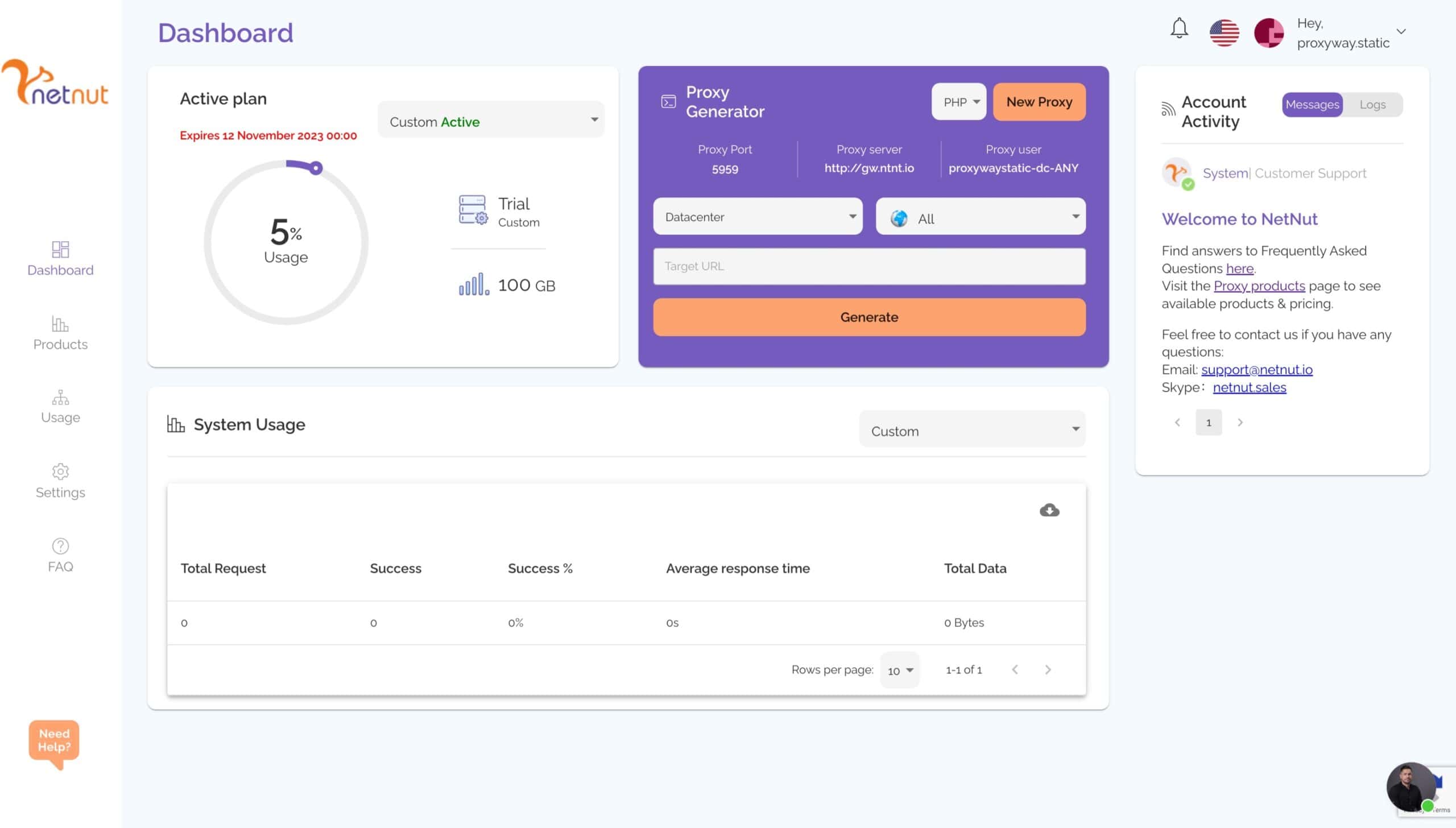
NetNut’s supports self-service for all its products, so you can get a plan via the dashboard. This will require entering your billing info with a lengthy form for company customers. You can opt to automatically renew plans if they expire or the traffic gets depleted, and the system allows having multiple plans active at once.
Once you’ve bought a plan, you can track its expiration and status on the dashboard’s main screen. There are separate pages in the Settings for downloading invoices and viewing your purchase history, along with traffic use during the billing period.
There’s no advanced functionality like setting usage limits, topping-up a plan, or getting estimations for the remaining billing period.
NetNut’s proxy servers all use the same entry gateway, adding parameters to the username to specify the proxy type, location, and sticky sessions.
First, you’ll have to configure your credentials or whitelist an IP address. NetNut hides this functionality under the Settings sections. For some reason, the tab for whitelisting is called Unauthenticated IPs.
To facilitate proxy setup, NetNut provides an interactive widget called Proxy Generator. It lets you choose a programming language, proxy type, country, and target URL. It then generates a code snippet for pre-defined HTTP libraries.
In my opinion, the widget’s current implementation is severely lacking:
- It shows more locations than NetNut’s static residential proxies support, so you’ll have to guess. In addition, it provides no way to specify a city, even though this functionality is supported.
- You can’t use it to generate a list of endpoints or specify sticky sessions.
- The widget is unable to fetch your credentials and requires entering the password.
- Generating a code snippet for some programming languages also includes an ancient user-agent header with Chrome 55 and Windows 8. The other programming languages don’t do this.
- I’m not sure why NetNut allows specifying a target and doesn’t simply use an in-house or external proxy checker like every other provider.
To locate the missing instructions, you’ll have to browser around NetNut’s documentation. All in all, the experience is messy and begs for improvement.
NetNut is generally very good with usage statistics. You can get granular reports filtered by a date range (preset or custom). The basic version includes request count, success rate, response time metrics, and data use. You can further filter use by countries, domains, and even connection errors. Overall, you get much more than most competitors can offer out of the box.
While all this sounds great in theory, the actual implementation is once again very imperfect. For one, there are no visualizations whatsoever. Second, filtering by date didn’t work for me.
And third, I actually got conflicting data after turning on different toggles. The basic report showed that we had made over 600k requests with a success rate of 93%. With domain filtering on, the number of total requests now neared a million, and they had an average success rate close to 100%! Think of that what you will.
Documentation
NetNut has historically had issues with presenting information. Thankfully, the situation has improved significantly.
First of all, NetNut has a rather lengthy FAQ and integration guidelines with major tools. In early 2024, the provider also launched a documentation hub for each product. It’s structured well and does a good job at guiding you through the services.
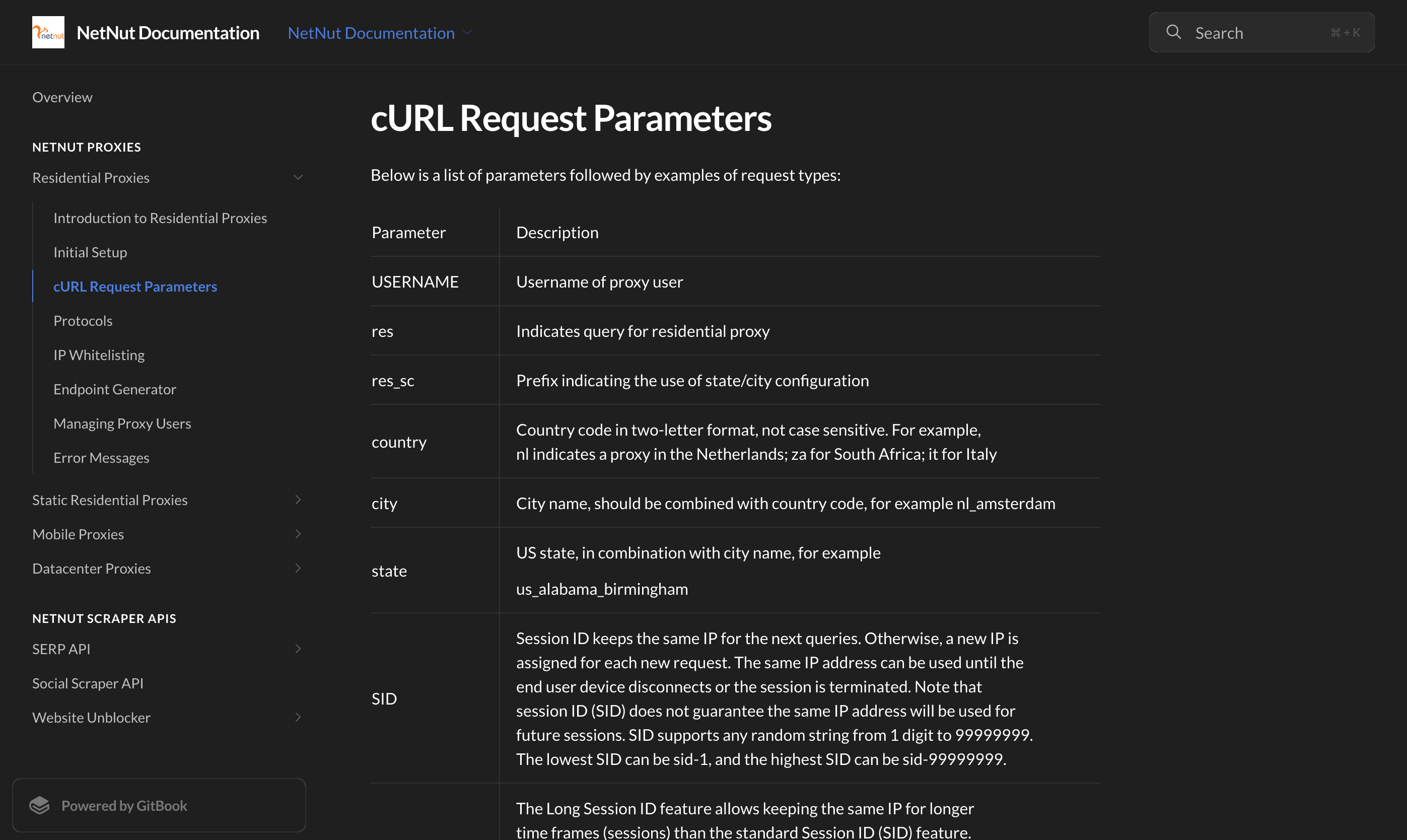
Hands-On Support
NetNut offers life chat support during Israeli working hours, as well as email support. Customers further get their own dedicated account manager. This way, most communication is done on Skype.
When I registered for a free trial, one of NetNut’s managers messaged me after 15 minutes or so. He immediately enabled my test account and provided me with instructions. They usually create a separate chat for active users and respond quite quickly.
However, NetNut’s customer service isn’t always as fast. On average, it took them more than an hour to respond to our emails, and the estimated time for a live chat reply is around two hours. This isn’t ideal for emergencies.
Conclusion
So, what can I say about NetNut? Quite a few positive things, actually.
The little squirrel packs a punch. The proxy networks we tried are large and perform well, aside from some timeout issues. And if you require ISP proxies, it’s one of the best developed options in the market in terms of features.
Proxies aside, improvements are needed. This applies especially to the user experience side of things: the setup widget is barely functional and customer support has limited working hours. There’s also the matter of pricing plans that start from hundreds of dollars and are no longer competitive in the entry range.
That said, NetNut’s parent company has been shedding away its other properties to focus on the proxy business. This means more marketing budget, more products, and an overall push to grow. We’re already start to see new scraping APIs emerge from the workshop.
Even now, NetNut is a terrific choice for scraping, market research, even social media automation – especially if you use thousands of gigabytes of data. Scale and flexibility are the company’s strong points, and they’re not to be underestimated.
All in all, NetNut is not quite the highest tier provider just yet, but it’s surely getting there.
NetNut Alternatives

A strong NetNut alternative for web scraping. You get a larger IP pool, better performance, and web scraping APIs that take care of proxy management.

Decodo offers cheaper rotating proxy pools, several scraping APIs, and a great user experience. It’s a strong performer and an overall value choice.

Bright Data has one of the best infrastructure and tooling on the market. It offers not only proxies, but also proxy APIs, powerful proxy manager, and complete data sets.
Want more? View the full list of the NetNut alternatives.
Recommended for:
Data-hungry enterprises with strict compliance needs.
